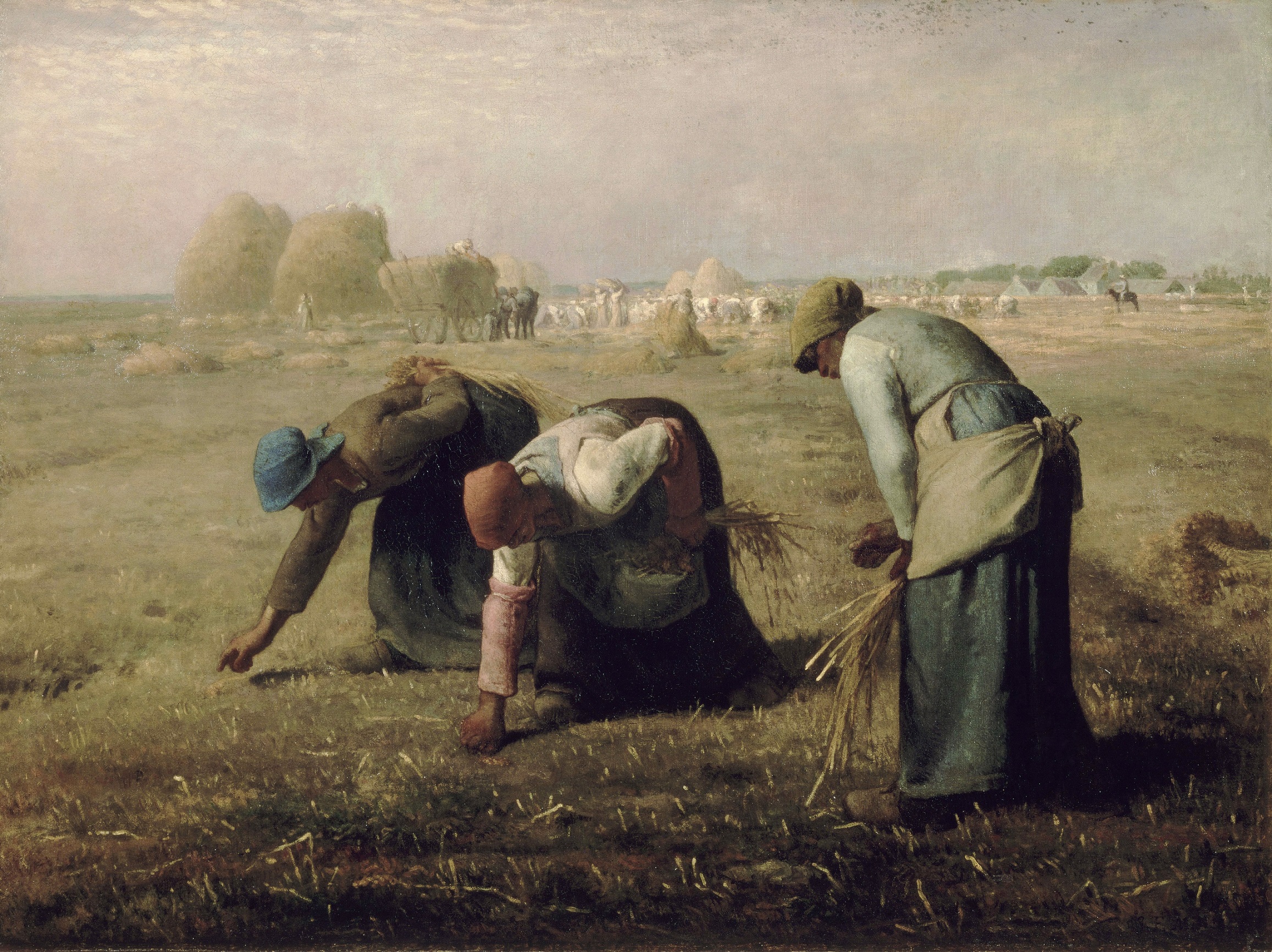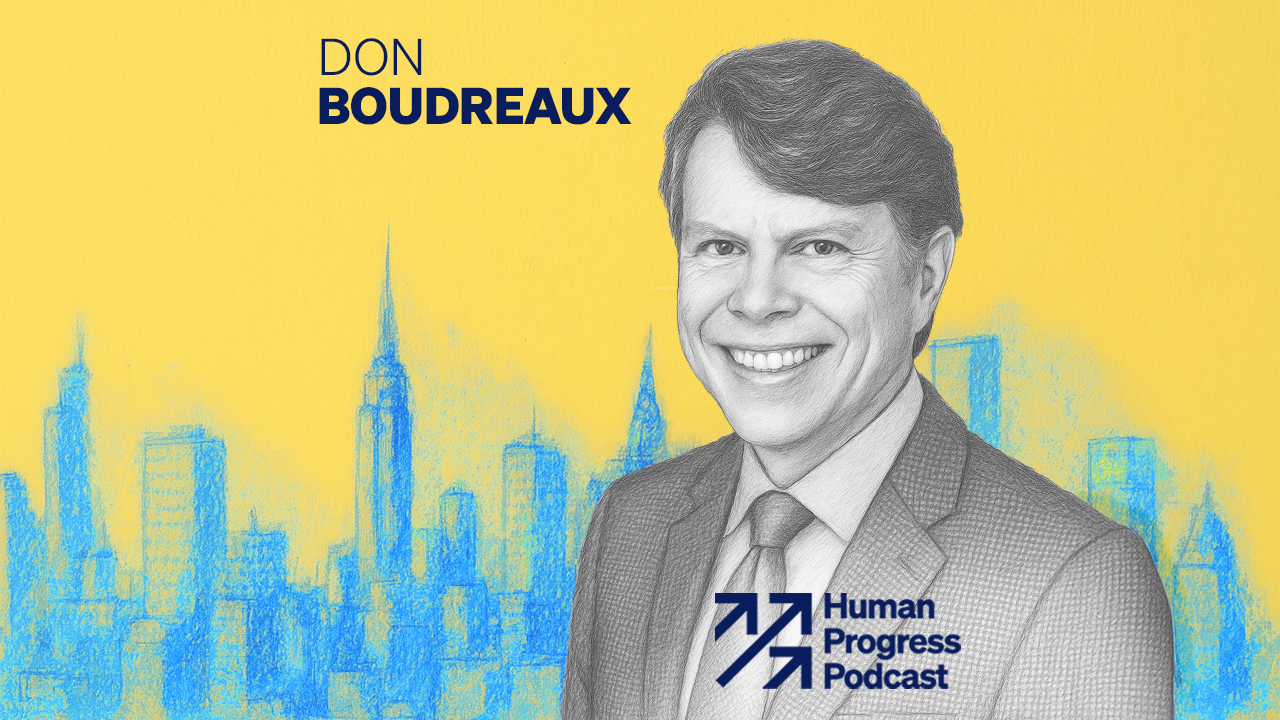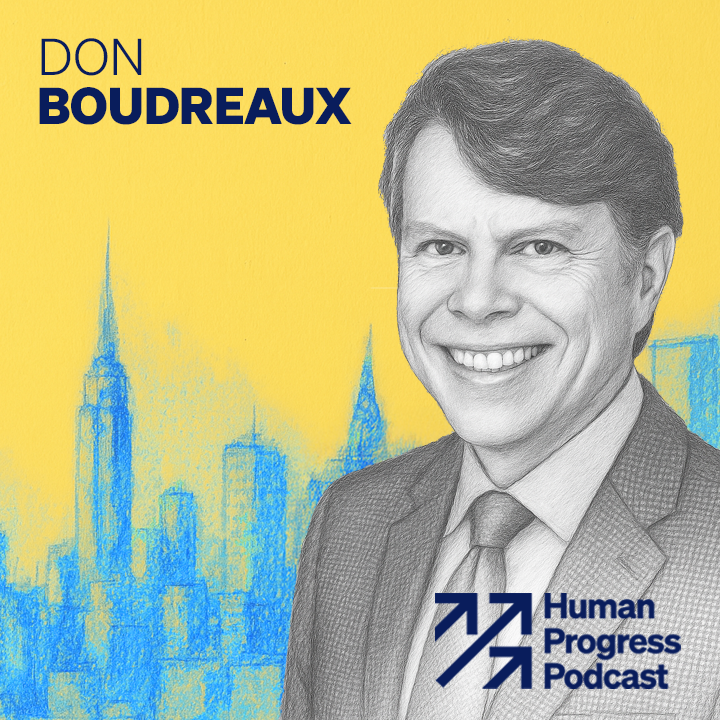Listen to the podcast or read the full transcript here.
Today, I have with me Don Boudreaux, a professor of economics at George Mason University. He has a new book out, co-authored with the former senator from Texas, Phil Gramm, called The Triumph of Economic Freedom: Debunking the Seven Great Myths of American Capitalism. It’s a fantastic read, full of information and killer arguments.
We’re going to discuss that book today. But first, Don, why is the study of economic history important?
What we think we know about the past determines how we assess the present.
For example, if we think that in the past, a certain monetary policy did this or did that, that’s going to affect how we think monetary policy should be conducted today. So, in order to make good decisions in the present, we have to do our best to understand how various policies worked out in the past. That’s what we try to do in the book.
Let’s jump in and tackle trusts, or as we call them today, monopolies. We often hear about the power of monopolies in today’s America, but let’s go back to the 19th century. What was the trust problem, and what was the solution meant to address?
Some of the first original research I did as a young scholar was looking into the Sherman Antitrust Act of 1890. I had a colleague, Tom DiLorenzo, who, in 1985, published a wonderful paper on the origins of the Sherman Act, 95 years after its enactment. Astonishingly, no one in that near century-long period had ever bothered to check what had actually happened to the prices and outputs of the industries that were supposedly monopolized. So, Tom looked at these data and adjusted them for deflation—there was a deflationary period from the end of the Civil War until the early 20th century—and found that in the decade leading up to the Sherman Antitrust Act, the prices of the outputs of these allegedly monopolized industries fell faster than prices in the economy as a whole. Likewise, the outputs of these industries rose faster, and in most cases, multiple times faster than the output of the overall economy.
This is inconsistent with the monopoly story. Monopolies are supposed to raise prices, not cut prices. In reality, there was no monopoly problem in the 1880s; there was a competition problem. We had, for the first time, a fully transcontinental economy, thanks to the railroads and the telegraph, and soon thereafter, the telephone. So, a lot of firms could now take advantage of economies of scale. John D. Rockefeller in petroleum refining, Gustavus Swift in meat slaughtering, James Buchanan in tobacco manufacturing, and so on. And these firms did grow large, but “large” is not an appropriate definition of a monopoly. A monopoly is a firm that can suppress competition, raise prices, and suppress output. These firms did the opposite. They grew big, but they grew big precisely by being so efficient that they could lower their prices and expand their output.
Now, whenever this happens, other producers complain. And in the 19th century, the complaints came disproportionately from local butchers and local cattle raisers. Before the railroad and refrigeration, slaughtering took place locally. So, when the first meat packers set up shop in Chicago and began centrally slaughtering livestock and shipping the meat out across the nation by refrigerated railroad car, they destroyed an age-old line of work. These local butchers and independent cattlemen raised hell, and local politicians listened to them, villainized these firms, and attacked them with antitrust statutes.
Frankly, these early antitrust statutes, and the subsequent ones, were not intended to address what was truly perceived as a problem of monopoly. They were aimed at placating disgruntled producers who had been outcompeted by larger, more efficient, and more entrepreneurial rivals.
You mentioned the D word, “destruction.” The destruction of local butchers by big, centralized butchers. Is that a good thing?
Well, economic growth requires that resources move from where they are less productive to where they are more productive, so change is inevitable if you want economic growth.
Some people might naively say, “Well, look, we’ve had enough growth, let’s just stop now,” and try to freeze everything in place. Now, I’m sure almost everyone alive today is very happy that our ancestors did not settle for the level of economic activity that existed when they were alive. You and I would not be talking over Zoom, and web designers would have eight legs.
However, even if we all agreed to settle for our current level of prosperity, we would still need to allow economic change, because some things are beyond human control. Supplies of raw materials can dry up. Natural disasters can destroy factories. So, we always need people to be able to adjust to the facts on the ground. That flexibility, that entrepreneurial alertness and creativity, is inseparable from capitalism. If you try to freeze our economy in its current pattern, you’ll collapse it. We can either continue to move forward and embrace creative destruction, or we can collapse into destitution.
Yeah, that’s fundamental. There are, in Donald Rumsfeld’s famous words, “unknown unknowns,” and we want to be as rich and as technologically sophisticated as possible when those challenges arise.
Okay, on to the big one, the granddaddy of them all, the Great Depression. Can you steelman the anti-market position about what happened in 1929? What went wrong?
Yes. In the 1920s, a fundamental contradiction of capitalism reached its peak. The rich were getting richer relative to the poor, and rich people spend a smaller portion of their incomes than poorer people. By the late 1920s, you had an increasingly unequal distribution of income, and a smaller portion of that income was being spent. As a result, America’s factories were producing more than America’s factories could sell, and a terrible spiral took place. The factories started laying off workers, which further reduced the income of factory workers, who responded by reducing their spending, which further reduced economic output and employment.
All of this happened when Herbert Hoover was president. And as everyone knows, Hoover was a staunch advocate of laissez-faire. He was a do-nothing president. The Depression happened, and Herbert Hoover just sat in the White House and twiddled his thumbs, hoping this recession would go away. Then, of course, it got worse. By 1932 and 1933, unemployment in America hit 25 percent. Fortunately, the American people elected Franklin Roosevelt, who came to office with a whole bunch of really good ideas and smart advisors. They developed the New Deal, a system of relief programs, and we were able to start recovering. Finally, World War II comes along, there’s more government spending, and we get out of the Depression. That’s the myth.
That’s what a lot of American kids learn at school. But I suspect that you don’t quite agree with that interpretation of the Great Depression.
No, I don’t. Let’s start with the easy one: Hoover was not a do-nothing president or an advocate of laissez-faire. Hoover was the president who signed the Smoot-Hawley Tariff Act. He created the Reconstruction Finance Corporation. Hoover spent at a deficit during every year of his administration. In fact, one of Franklin Roosevelt’s campaign platforms was that Hoover was too big a spender. Hoover’s administration was the first time, really, that any sitting American president did much to combat an economic downturn. So that’s a complete fallacy.
There are other problems too. In the 1920s—and this is from research done by Simon Kuznets, a Nobel Prize-winning, very respectable economist—the distribution of income did not grow more heavily toward upper-income Americans. In fact, it became a little bit flatter in the 1920s. In terms of spending, the mythical theory says that there just wasn’t enough spending to buy what the factories were producing. But if you look at the data on consumer spending in the 1920s, it was off the charts. It was a boom time for Americans.
What actually happened, and here I’m quite conventional, was bad monetary policy. The Fed was created in 1913 to serve as a lender of last resort. Before the Fed was created, whenever banking crises would happen, they had private arrangements where bank clearing houses would get together and channel liquidity to the parts of the banking system that needed money. And these panics, as they were called, were quickly undone. But after the panic of 1907, people said, “Well, we can’t have this. Let’s get the government to take over this process.” And they created the Federal Reserve.
When the downturn began in August of 1929, the Fed should have stepped in to prevent the money supply from contracting. But the Fed just stood by, and from 1929 to 1933, the money supply contracted by over 30 percent. That is huge. Then, on top of that, you have the hyperactive Hoover, who administered a historically unique level of economic intervention. And then it gets worse under FDR.
The big problem was what the economic historian Bob Higgs calls regime uncertainty. Hoover and Roosevelt became increasingly hostile to businesses and investors throughout the 1930s. Basically, they scared investors off. Well, if you want economic recovery, you can’t scare investors off. You can’t threaten their property rights. You can’t threaten to tax away their earnings. You can’t threaten to control prices. All of this was being done. Roosevelt became a little more friendly to businesses when he needed them to cooperate in the war effort, but there was still concern that after the war, Roosevelt would return to his increasingly anti-capitalist stance. But of course, Roosevelt died in April of 1945, and Truman, for all of his imperfections, was a businessman, and he was perceived, quite rightly, as much less radical than Roosevelt.
Higgs dates the end of the Great Depression as immediately after the war, 1946 or 1947. The war years, we can’t say much about. You’re conscripting people into a military, so unemployment looks low, but that’s not the result of an improved market economy. Prices are controlled. Wages are controlled. Certainly, the standard of living of ordinary Americans back home was falling. So, if you define the end of the Depression as a return to high and rising living standards for ordinary people, you don’t get any evidence of that until the years immediately following the end of World War II. So, the New Deal didn’t cure the Great Depression. If anything, it extended the Great Depression throughout the 1930s. If we’re going to actually rely on data, we must say that the Depression only ended after the end of World War II.
Now on to the final topic, the Great Recession.
The mainstream explanation is that financial deregulation created the housing crisis. Greedy, mustache-twisting bankers lent money to people who they knew couldn’t repay the mortgage loans, which anybody with common sense would know is not a good banking strategy.
In fact, what happened is that starting in the early 1990s, the government became intent on increasing the rate of home ownership. So, the government wanted banks to extend mortgage lending to people that they otherwise wouldn’t lend to, but the banks didn’t want to lend money to people who were unlikely to pay them back. So, the federal government said, look, Fannie and Freddie, increasingly large shares of your portfolio have to be made up of subprime mortgages, or we’re going to do all kinds of nasty things to you.
Say you’re a bank in Omaha, Nebraska, and someone comes to you to borrow money to buy a house. In the past, you’d say, “Sorry, you don’t have 20 percent to put down, and you don’t have a high enough income. I’m not going to lend you the money.” But now, Freddie comes by and says, “I really want to buy some subprime loans from you, so if you make some subprime loans, I’ll buy them from you and relieve you of the risk.” So, when that same borrower comes back, you lend them the money and sell the mortgage to a government-backed firm. Now you’re off the hook, but that bad loan is still out there. The result was that increasingly large numbers of house mortgages were held by people who couldn’t afford to repay them, and so any decline in economic activity, and certainly any decline in housing prices, would put a lot of the homeowners under water, and that is what eventually happened. The house of cards collapsed.
One final question: Why don’t bad ideas die?
There are at least two reasons.
First, if you show me a bad economic idea, I will show you a special interest group that benefits from it. This is what Bruce Yandle called the “Bootleggers and Baptists” idea: when you have a sincere but mistaken belief backed by venal interest groups who stand to gain materially by the maintenance of those beliefs, those beliefs become entrenched.
The second reason is that bad ideas are usually easier to grasp than good ideas. Good ideas tend to involve one or two steps of reasoning beyond the bad idea. And so, to push out bad ideas and replace them with good ideas requires good education. So, all the things that we’re doing, all the blogging and podcasting and tweeting.
It’s a struggle to present good ideas, but we have no choice. We have to keep doing it. And history shows that, if you’re effective at it, you can sometimes push bad ideas aside and replace them with good ideas. But it’s a never-ending battle. It’s not like the bad idea is defeated and then it goes away forever. It’ll always lurk. So, we always have to be at the ready to challenge it with good ideas. And we have to be very patient.



